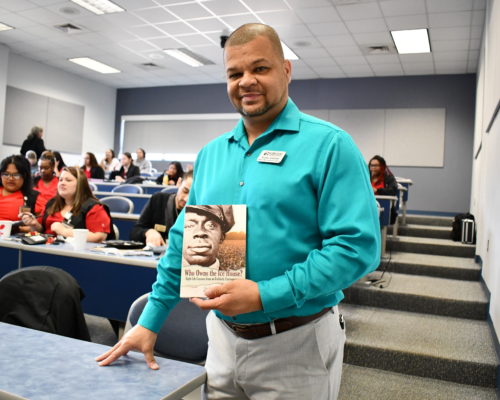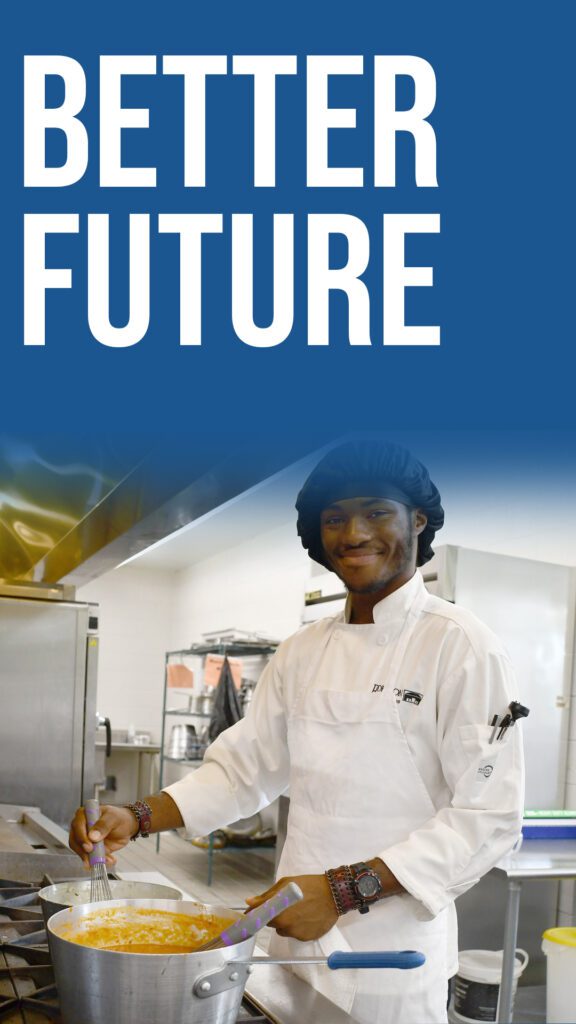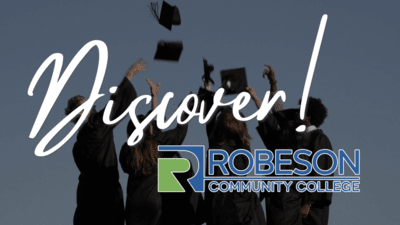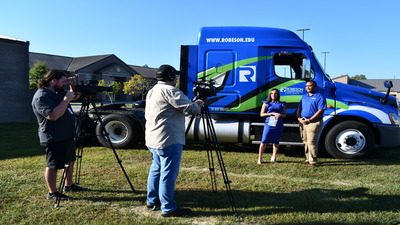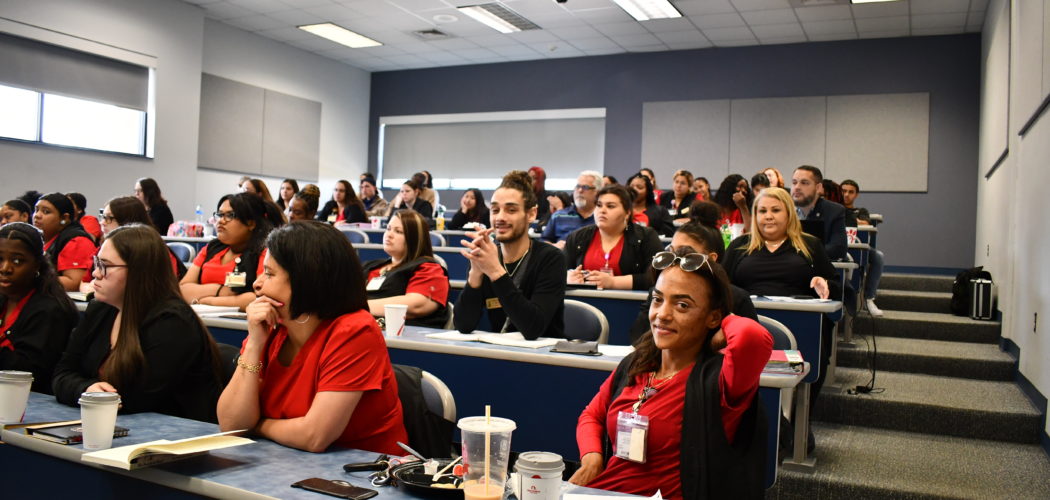
“How successful do you want to be?” Ice House Entrepreneurship Program gets students motivated about starting a business
Students at Robeson Community College learned today that starting a business is a big step that requires a great deal of time, thought, research, and funding, but in the end, can be very rewarding and fulfilling.
Using the book, Who Owns the Ice House? Eight Life Lessons from an Unlikely Entrepreneur by Clifton Taulbert and Gary Schoeniger as the backdrop, students gained valuable insights into starting a business based on the true story of Uncle Cleve, who owned an ice house during a time of legal segregation in the deep south, along the Mississippi Delta.
At times, it was standing room only, as students gathered together to seek the knowledge and expertise of the guest speakers on how to start a business, build a brand, and how valuable life skills can make a difference in all that you do.
“Uncle Cleve was an entrepreneur, he was the person who brought ice to your house,” said Lisa Hunt, the assistant vice president of grants and foundation, as she spoke on wealth and community. “He lived during a time of a lot of racial unrest, the haves and have-nots.”
“But Uncle Cleve didn’t let that stop him,” Hunt said. “He had a product that everyone needed – ice.”
Hunt went on to tell of Uncle Cleve, how had built a name for himself, how he was trusted within his community, and how people knew they could depend on him. He was reliable.
“He saw a problem,” stated Debbie Bruce, the director of the RCC Small Business Center, as she spoke on persistence and opportunity. “He saw an opportunity to solve that problem and he knew how to get the ice to the people… he knew his customers, and they trusted him because people often gave him a key to their house to deliver the ice.”
“Money didn’t rule Uncle Cleve, he used the money to accomplish his goals,” Hunt told the students. “When you work for yourself, you have to sacrifice your time. When you think about your career, your pathway, you’ve got to make that commitment, network, use your time wisely, and know how to budget.”
Building a business is not easy and often requires more than just money. The future of anything we set out to do often depends on the choices we make today.
“The ability to choose the way we respond to our circumstances is perhaps the greatest power we have,” stated Rudy Locklear, the director of BLET and Criminal Justice, as he spoke on choice and action. “Every decision you make, every choice you make, has consequences good or bad, and those choices have led you where you are now.”
Locklear spoke about how he always knew he wanted to enter law enforcement since he was enrolled in the D.A.R.E program in elementary school, and he knew he had to make good choices and actions to get where he wanted to be.
“It takes a special kind of person to go into public service – many of you here today are going to be dealing with people in the public, even in a private entity,” Locklear said. “The stuff you put out on social media, the things you say online, that will follow you… some choices you make, some actions may keep you from reaching your goals.”
Students learned that life is not a lottery, the ability to choose the way we respond to our circumstances is fundamental to having an entrepreneurial mindset.
“Choices rather than circumstances will ultimately shape our lives,” Locklear said. “You’ve got to be careful who you hang with… every decision you make will affect you throughout your life.”
Decisions such as writing a bad check, committing crimes, and not paying bills, Locklear reminded everyone, can prevent you from getting loans, starting a business, and building clientele. It can prevent you from obtaining career-specific credentials and certifications.
The way that you live your life ultimately becomes your brand in the eye of the public.
“Branding is the way that your customer perceives you,” RCC’s Director of Institutional Research and Effectiveness Dr. Kenneth Bowen stated, as he spoke on branding and knowledge. “Uncle Cleve talks about how your brand is you. It centers around integrity, your reputation, what people will say about you when you are not around.”
Bowen gave students several tips on how to brand themselves, such as starting a LinkedIn account and building their brand via social media, but he also warned, “If you have an account that does not align with what you have learned today, I would delete those accounts immediately”
He also encouraged students to lock in a domain name for a website with the name of the business they want to start, to limit the name of their new business to 1-2 syllables to “make it catchy,” to develop an elevator pitch, and to check the NC Secretary of State website to make sure the business name they want to use isn’t already taken.
“When you are first starting out, you have to hustle,” Kate Wiggins with NC Idea told students. “You have to serve a lot of different customers, you have to do research to find out who your real customers are, it’s an opportunity discovery to learn what the market is.”
She continued by saying, “You will say no to customers, and they will say no to you, but that’s ok. Surround yourself with people who want to see you succeed.”
Part of being successful, Bowen said, is knowing your niche and understanding your business.
“There are many people out here selling to you,” Bowen said. “What makes your product different? How do you stand out from the crowd? What makes you different from competitors?”
One student added during the discussion, “How successful do you want to be? How branded do you want to be? Don’t be afraid to fall or fail… you might get 100 ‘no’s,’ but if you stay persistent, you will eventually get a ‘yes.”
Another student said, “You might have to go through a lot of obstacles, but keep pushing… patience is key.”
“Uncle Cleve took pride in what he did,” Bruce said. “He knew his customers… every little bit that you know about your clients will help you, it will help you to start a wonderful conversation with your clients when you ask them how their children are doing, for example, and they will like that you remember something about them… it’s the little things that can matter.”
At the end of the seminar, students had an opportunity to create a vision board.
“This is the hands-on part of this presentation,” stated Cynthia Quintero, a counselor at RCC. “The purpose of creating a vision board is to visualize your goals, track your progress, and stay motivated.”
Students used markers and magazines to create the boards.
“Uncle Cleve was a visionary,” stated Susan Moore, who is also a counselor, as she helped students create the vision boards. “He didn’t have just one goal. He diversified. He put away some money and saved it, He wanted to open up his own garage to fix expensive vehicles, he bought a book and he taught himself…There are other things that you can do too, so keep going. Persevere. Be persistent. Make good choices and be a visionary.”
The event was facilitated by RCC Instructor Scottie Locklear and was funded through the First Americans Pathways to STEM Success grant.
